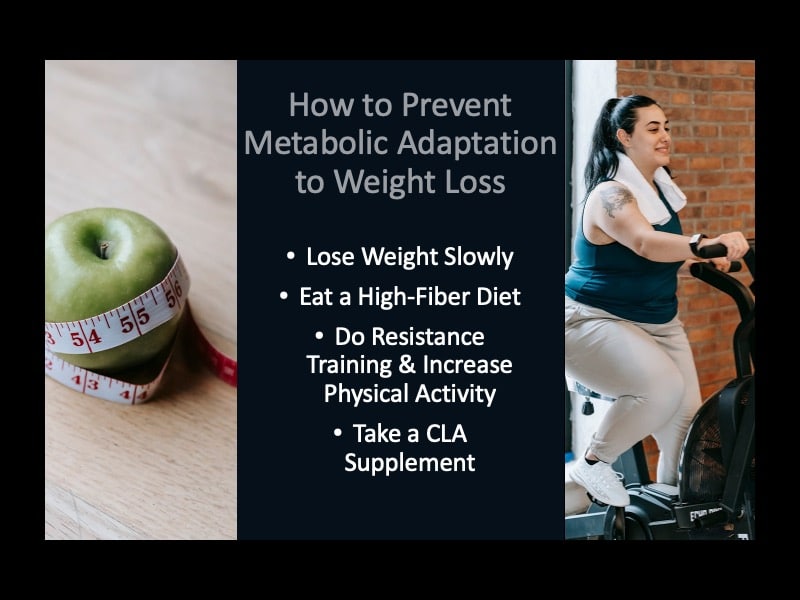What is Metabolic Adaptation to Weight loss & How to Prevent
Metabolic adaptation to weight loss is a biological response following weight loss in which the body decreases energy expenditure, improves its metabolic efficacy, and increases signals for energy intake as an apparent survival mechanism to regain or retain lost body mass.
Consequently, metabolic adaptions make continued weight loss more difficult while increasing the chances of weight regain, especially in those who are overweight or obese.
Metabolic adaptation can play a significant role in the long-term success of many weight loss journeys as body mass makes up the largest component of resting metabolic rate (RMR), and decreasing body mass inherently results in decreased RMR.
However, you can reduce and prevent metabolic adaptations to weight loss with the simple, effective tips in this article!
What is Metabolic Adaptation to Weight Loss?
As mentioned before, metabolic adaptation to weight loss is a biological response that happens when someone loses weight, in which the body decreases energy expenditure, improves metabolic efficacy, and increases signals for energy (calorie) intake as a survival mechanism to regain or retain lost body mass (Martínez-Gómez & Roberts, 2021; Trexler et al., 2014).
The primary cause of metabolic adaptation to weight loss is losing weight too quickly, but metabolic adaptations to weight loss happen with any significant weight loss efforts.
Since metabolic adaptation to weight loss is an inherently biological feature of the human body, it can be difficult to fight.
As the body has a biological system in place to regain fat mass that is lost, it can be difficult to prevent “fat overshooting” and the regain of additional fat mass following periods of weight loss (Dulloo et al., 2015).
Therefore, it is critical that anyone who is beginning a weight loss program be aware that repeated bouts of weight cycling (weight loss followed by weight gain) can produce more metabolic adaptions and additional “fat overshooting.”
For these reasons, it is important to make healthy lifestyle improvements that produce weight loss instead of just trying to lose large amounts of weight quickly through extreme dieting or other extreme measures.
By reducing the number of weight cycling bouts, individuals will have better chances for long-term body composition improvements.
How to Prevent Metabolic Adaptation to Weight Loss?

Exercise has been theorized as a primary solution to maintaining fat-free and lean body mass, the most metabolically active components of total body mass, to combat metabolic adaptations to weight loss.
However, some research has indicated that even the preservation of fat-free mass does not negate decreases in RMR caused by substantial body mass loss (Johannsen et al., 2012).
Exercise can play a role in reducing metabolic adaptation to weight loss (as I will explain below), but there are other options as well.
Here are some of the most important tips to reducing metabolic adaptation to weight loss so that you can continue to lose weight and keep off the weight you have already lost!
Lose Weight Slowly
If you want to lose weight and keep it off, a primary way of combatting metabolic adaptation for long-term weight loss success is that individuals should attempt to utilize the smallest energy deficit that promotes substantial weight loss.
Large energy deficits will result in increased lean body mass losses and should be avoided in an effort to maintain or even increase lean body mass losses during long-term weight loss programs.
Personally, I suggest a goal of losing two pounds per week or less.
This means, you should maintian a calorie deficit of around 500-700.
Any more than this rate can have detrimental long-term effects.
Weight loss diet plans that attempt to tell you to lose 20 pounds in two weeks or other irrational goals are more likely to promote metabolic adaptations to weight loss.

Eat a High-Fiber Diet
A high-fiber diet is one of the most effective ways to combat metabolic adaptation to weight loss, as it promotes satiety, stabilizes blood sugar levels, and supports gut health—key factors in long-term weight management (Melby et al., 2017).
High-fiber foods, particularly those rich in prebiotic fibers, play a crucial role in maintaining a healthy gut microbiome.
Prebiotics are a type of fiber that feed beneficial gut bacteria, helping to regulate metabolism, enhance digestion, and support sustained weight loss.
When prebiotic fibers ferment in the gut, they produce short-chain fatty acids (SCFAs) such as butyrate, acetate, and propionate. These SCFAs have been shown to:
- Improve insulin sensitivity and glucose metabolism, reducing fat storage.
- Enhance energy expenditure by promoting thermogenesis and increasing fat oxidation.
- Regulate appetite hormones like leptin and ghrelin, decreasing hunger and preventing overeating.
- Reduce inflammation, which can interfere with weight loss and metabolic efficiency.
Some of the best prebiotic-rich food sources to include in your diet are:
- Asparagus
- Garlic and onions
- Leeks
- Bananas (especially unripe ones, which contain resistant starch)
- Oats
- Chicory root
- Legumes (lentils, chickpeas, and black beans)
By consistently eating fiber-rich foods—especially prebiotic fibers—you can improve gut health, regulate metabolism, and counteract some of the metabolic slowdowns that occur with weight loss.
Additionally, a well-balanced gut microbiome has been linked to better weight maintenance, reducing the risk of regaining lost weight after a diet.
Do Resistance Training & Increase Physical Activity
There are many aspects of metabolic adaptation to weight loss and its potential for promoting weight regain, but I believe the role of physical activity in preventing weight regain despite metabolic adaptation is critical.
In a study on contestants of “The Biggest Loser,” it was clear that significant long-term increases in physical activity played a key role in preventing weight regain and promoting additional weight loss or weight management (Hall, 2021).
This suggests that staying active is not just beneficial for weight loss—it’s essential for keeping the weight off.
Not only does physical activity promote lean body mass gains that offset some of the metabolic adaptations created by body mass loss, but it also offsets decreases in RMR and has an effect on appetite signaling feedback.
Along with dieting to reduce caloric intake, developing a physical activity program is crucial for long-term weight loss success.
Resistance Training: The Key to Maintaining Metabolism
Weight training is one of the most effective ways to combat metabolic adaptation because it helps preserve and even increase lean muscle mass, which is a primary determinant of RMR.
Since muscle tissue burns more calories at rest than fat tissue, maintaining muscle during weight loss prevents dramatic metabolic slowdowns.
Key benefits of resistance training for metabolic adaptation include:
- Preserving Lean Muscle Mass – Prevents excessive loss of metabolically active tissue during weight loss.
- Increasing Post-Exercise Energy Expenditure – Strength training induces excess post-exercise oxygen consumption (EPOC), meaning the body burns additional calories even after the workout ends.
- Enhancing Insulin Sensitivity – Improves how the body processes carbohydrates, reducing fat storage.
- Regulating Appetite Hormones – Helps manage hunger and satiety signals, reducing cravings and overeating.
Recommended Resistance Training Guidelines:
- Train at least 3-5 times per week, focusing on compound exercises like squats, deadlifts, lunges, presses, and rows.
- Aim for moderate to high resistance (6-12 reps per set) to stimulate muscle growth and metabolic activity.
- Incorporate progressive overload, gradually increasing weights or reps to continuously challenge muscles.
Increase NEAT (Non-Exercise Activity Thermogenesis)
Non-exercise activity thermogenesis (NEAT) is the energy expended from all daily activities outside of structured exercise, including walking, standing, fidgeting, and household chores.
While structured workouts help with calorie burn, adding more NEAT to your daily routine can be even more significant in preventing metabolic adaptation and weight regain because it accounts for a major portion of TDEE.
Incorporating small changes to lose weight, such as standing more often, taking the stairs, or staying active with light chores, helps increase NEAT and supports long-term fat loss success.
Ways to increase NEAT:
- Walk more throughout the day – Set a goal of walking 8,000-12,000 steps per day to keep your metabolism elevated.
- Take the stairs instead of the elevator – Small changes in movement add up over time.
- Use a standing desk – Standing burns more calories than sitting and improves circulation.
- Do more household chores – Activities like vacuuming, gardening, and cleaning can increase energy expenditure and act as a “house cleaning workout.”
- Incorporate short movement breaks – Take a 2-5 minute break every hour to stretch, walk, or do bodyweight exercises.
Take a CLA Supplement
Unlike the other suggestions above, this suggestion to prevent metabolic adaptation to weight loss has less scientific evidence to support it, but I theorize that it can play an important role.
Conjugated Linoleic Acid (CLA) suppresses lipogenesis (the creation of body fat) and reduces lipoprotein lipase production in body fat, which promotes the storage of body fat (Kennedy et al, 2010).
Animal models consistently demonstrate anti-weight gain and anti-obesity effects of CLA, although human studies are inconclusive,
However, I believe CLA has enough promising research that it can be safely utilized to help prevent metabolic adaptation to weight loss.
If you would like to try a CLA supplement, I believe the best option is Bulk Supplements CLA:
Last update on 2025-04-15 / This article includes affiliate links/Images via Amazon Product Advertising API. I may earn commissions on purchases made through these links.
Final Thoughts: Keys to Preventing Metabolic Adaptations to Weight Loss
Metabolic adaptation to weight loss is a natural survival mechanism that can make sustained weight loss challenging, but strategic lifestyle adjustments can minimize its impact. The key to long-term success is avoiding extreme calorie deficits, maintaining muscle mass, and keeping overall activity levels high.
To prevent metabolic slowdowns and weight regain:
- Lose weight gradually – Aim for no more than 1-2 pounds per week to reduce lean muscle loss and metabolic suppression.
- Prioritize resistance training – Strength training helps preserve muscle mass, supporting a higher resting metabolic rate.
- Increase NEAT – Small, daily movements like walking, standing, and fidgeting can significantly boost calorie expenditure.
- Eat a fiber-rich diet – Prebiotic fibers support gut health, regulate appetite, and improve metabolic function.
- Stay consistent – Long-term adherence to healthy habits prevents weight cycling and metabolic disruptions.
By focusing on sustainable lifestyle changes instead of drastic dieting, you can outsmart metabolic adaptation and achieve lasting weight management.




